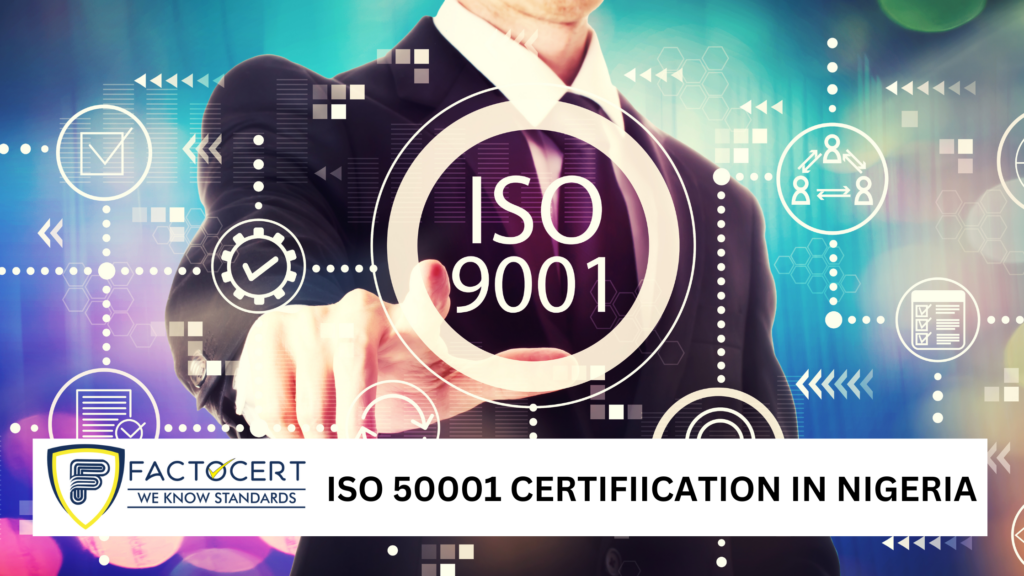ISO 50001 Certification in Nigeria
ISO 50001 certification in Nigeria, where energy costs are a significant operational expense, organizations are increasingly seeking ways to optimize their energy consumption. This translates to financial savings and signifies a commitment to environmental responsibility. The ISO 50001 standard emerges as a powerful tool for achieving these goals. This international standard provides a roadmap for establishing an Energy Management System (EnMS) that drives continuous improvement in energy performance. By embarking on the path to ISO 50001 certification in Nigeria, businesses can unlock a multitude of benefits, including:
- Reduced energy costs: A well-designed EnMS helps identify and eliminate energy waste, leading to substantial cost savings on electricity bills.
- Enhanced environmental performance: Lower energy consumption translates to reduced greenhouse gas emissions, contributing to a cleaner and more sustainable future for Nigeria.
- Improved operational efficiency: Implementing energy-saving measures often leads to process optimizations and overall efficiency gains.
- Demonstrated commitment to sustainability: ISO 50001 certification showcases your organization’s dedication to environmental responsibility, attracting environmentally conscious customers and partners.
What Nigerians Need to Know about ISO 50001 Certification
Obtaining ISO 50001 certification in Nigeria is a structured process. Here’s a breakdown of the key steps to guide you on this journey:
1. Commitment and Planning:
- Leadership Buy-in: Securing the unwavering support of senior management is crucial for the success of any ISO 50001 implementation. Management plays a vital role in allocating necessary resources, championing the initiative, and fostering a culture of energy awareness within the organization.
- Forming an Energy Management Team: Establish a dedicated team overseeing the EnMS implementation. This team should comprise representatives from various departments, ensuring a holistic approach to energy management. Consider including engineering, operations, facilities, finance, and human resources personnel.
- Developing an Energy Policy: Create a formal policy outlining your organization’s commitment to energy efficiency and continuous improvement. This policy should clearly and concisely communicate your organization’s stance on responsible energy use. Ensure the policy is communicated to all employees at all levels.
2. Energy Review and Baseline Establishment:
- Energy Review: Conduct a comprehensive energy review to identify areas of significant energy consumption within your organization. This may involve analyzing utility bills, equipment energy ratings, and production processes. Consider engaging a qualified energy auditor to assist with this process for a more comprehensive assessment.
- Baseline Setting: Establish a baseline for your current energy performance. This baseline serves as a benchmark against which you can measure future improvements. Consumption data gathered during the energy review is used to set this baseline.
3. Implementation and Control:
- Developing an EnMS Plan: Create a detailed plan outlining your actions to achieve your energy performance goals. This plan should consider legal and other relevant energy-related requirements in Nigeria. The plan should address aspects like:
- Specific energy-saving measures to be implemented
- Timelines for implementation
- Resource allocation
- Responsibilities for implementation and monitoring
- Operational Controls: Implement operational controls to ensure energy-efficient practices are followed across your organization. This could involve:
- Optimizing equipment settings for energy efficiency
- Establishing scheduled maintenance programs for equipment
- Raising employee awareness through training and communication on energy conservation best practices
- Design and Development: Consider energy efficiency from the outset when designing new equipment or processes. This proactive approach can lead to significant long-term energy savings. For example, specifying energy-efficient equipment during procurement can significantly reduce energy consumption over the equipment’s lifespan.
4. Measurement, Monitoring, and Analysis:
- Measuring and Monitoring: Establish a system for regularly measuring and monitoring your energy consumption. This involves installing necessary metering equipment and tracking key performance indicators (KPIs) relevant to your organization. KPIs include energy consumption per production unit, energy cost per square meter of office space, or fuel consumption per kilometre for transportation fleets.
- Non-Conformance and Corrective Action: Develop a process for identifying and addressing deviations from your EnMS plan. This ensures continuous improvement and maintains the effectiveness of your energy management efforts. When non-conformances are identified, a corrective action plan should be developed and implemented to address the root cause and prevent recurrence.
5. Internal Audit and Management Review:
- Internal Audit: Conduct regular internal audits to assess your EnMS’s effectiveness and identify areas for improvement. This helps ensure compliance with ISO 50001 requirements. Your designated energy management can conduct internal audits ISO 50001 Certification in Ghana
Why Factocert for ISO 50001 Certification in Nigeria
We provide the best ISO consultants Who are knowledgeable and provide the best solution. And how to get ISO certification. Kindly reach us at contact@factocert.com. ISO certification consultants work according to ISO standards and help organizations implement ISO certification with proper documentation.
For more information, visit ISO 50001 Certification in Nigeria





